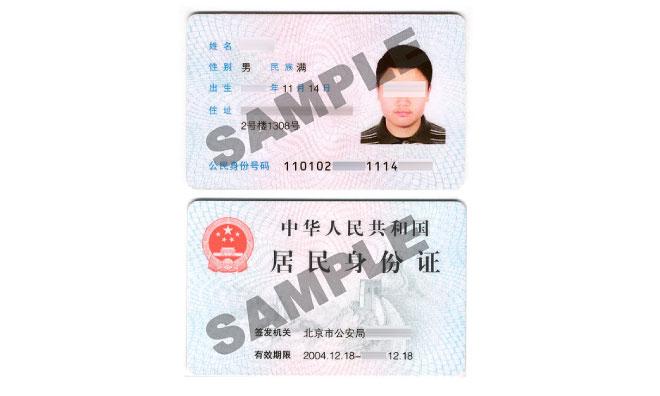In the midst of a scandal surrounding the death of a 15-year-old employee at one of the company's Shanghai factories, Apple manufacturing partner Pegatron has revealed that it uses advanced facial recognition technology to ensure workers are who they say they are.
A sample Chinese national identity card containing a citizen's name, gender, ethnicity, date of birth, place of permanent residence, and photo
Pegatron employs a three-step identity verification process designed to confirm that applicants meet all legal requirements for employment, according to a Monday report from the Wall Street Journal.
First, an applicant's Resident Identity Card — Â a plastic card that appears similar to an American driver's license — Â is scanned and its authenticity confirmed. Resident identity cards are issued by the Chinese central government, and are backed by a database containing a detailed personal history.
Facial recognition software is then used to compare the applicant's face to the photo on the card. Finally, the applicant's name is cross-checked with local and national police databases.
The revelation comes less than one week after Shi Zhaokun, a 15-year-old boy who gained employment at Pegatron's iPhone 5c plant by using forged documentation, died of pneumonia just one month after starting work. Shi's death was found to be unrelated to his work at the factory, though Chinese labor activists are still clamoring for information related to the deaths of four other Pegatron workers in recent months.
As China's economy grows, ensuring compliance with local laws — Â which prohibit, among other things, employing children under the age of 16 — Â is becoming more difficult for manufacturers who need to fill tens of thousands of seats on assembly lines throughout the country. Apple's Supplier Code of Conduct expressly forbids the hiring of underage workers, and the company severed ties with one supplier earlier this year after the supplier was found to be responsible for 74 underage labor violations.
 Shane Cole
Shane Cole








 Charles Martin
Charles Martin

 Malcolm Owen
Malcolm Owen
 William Gallagher
William Gallagher

 Christine McKee
Christine McKee
 Wesley Hilliard
Wesley Hilliard









3 Comments
Good thing Apple is associated to this supplier, without Apple relation no one in the western world would care about Pegatron employees, so sad that no other pegatron clients has talk to the media yet.
Voice analysis. If you sound like Justin Bieber, you're probably under age.
I was wondering why staff were required to wear a fake mustache when they came to work...